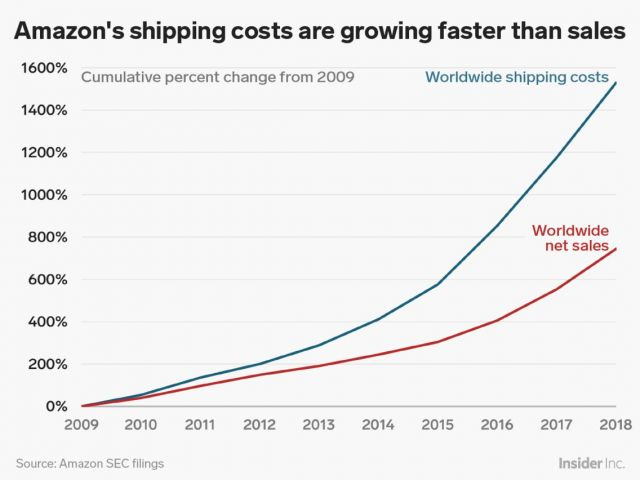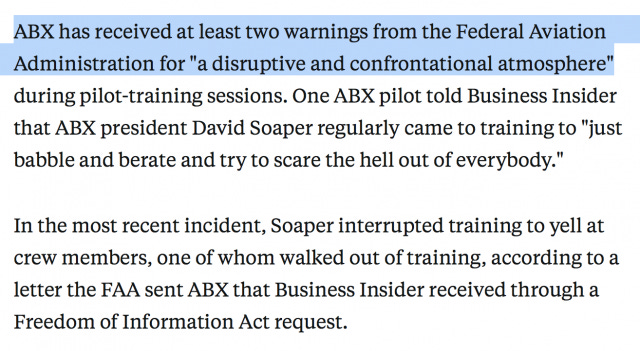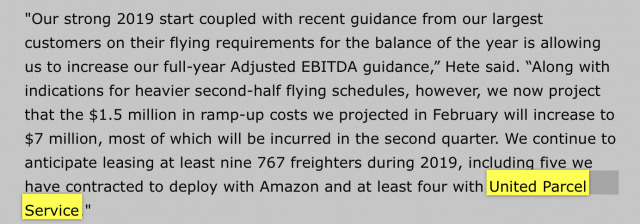Walmart and one-day shipping. ATSG plus UPS plus Amazon equals confusion.
Hello all!
Chicago remains cold and immune to spring. The only thing that makes this okay is that New York is also rather chilly, meaning I'm not missing the only time of the year in which being outside in NYC is tolerable (aka not freezing and not smelly).
Before we get into it, I wanted to share an interesting note from a subscriber. I mentioned in last week's rendition that I found dubious a logistics executive's take that automated freight brokerages would not take off due to the "increasing complexity of supply chains." A reader sent me this note:
Agreeing to risk underestimating the growing complexity of over-the-road supply chains, I think Uber Freight's presence will grow notably. Box truck/cargo van part-time (or FT) drivers will grow in number as the barrier to entry is lower than traditional trucking. Facsimiles will be replaced by algorithms. Even Charlie and Warren underestimated Bezos. It will just take some time.
As always, your thoughts on the world of logistics or predictions on if/when spring is coming are welcome at rpremack@businessinsider.com.
1. One-day shipping? Easy-peasy, Walmart says
I've been particularly interested in Walmart's foray into e-commerce. Its holiday online sales jumped by 43% in 2018 from the year before. But increased sales in the world of e-commerce doesn't necessarily mean $$$, as the logistics network involved in e-commerce is far more complicated and pricier than store delivery costs. And they can get out of control as consumers expect ever-faster deliveries — just look at how Amazon's transportation costs have skyrocketed in recent years:

The stakes for Walmart.com are raised again with Amazon's one-day shipping move. A UBS note from Monday cautioned that Walmart would have to spend $215 million in incremental investment to keep up with Amazon's one-day shipping announcement. (Amazon said they'll have to spend $800 million in the next quarter on the move.)
Then today, two days before we expected to hear anything about Walmart's response, e-commerce CEO Marc Lore announced Walmart was launching next-day shipping, starting today in Phoenix and Vegas. By the end of 2019, 75% of Americans can have free next-day shipping on orders totaling $35 or more — without a Prime-like membership program! (The two retailers have since become embroiled in some sort of tweet battle today.)
It's impressive, but shipping isn't really part of Walmart's e-commerce domination strategy. At least not right now.
Around 40-60% of Walmart's e-commerce sales are actually from online grocery pick-up — not packages sent to your home. Because there are fewer packages that sales would suggest, that makes it relatively easier for Walmart to scale its one-day shipping network than we might expect.
An Amazon Prime membership succeeds to bind the consumer to using Amazon, but Walmart's shipping minimum avoids a pricey logistics problem. Amazon consistently has to deliver in two days, say, a single tweezer through its delivery network for a Prime member in Chicago, and then a pair of shoes a week later, even though it would be far cheaper to just combine the two shipments if the customer (that's totally not me) were forced to order both products at once.
I'll be continuing to watch whether Walmart can continue succeed at getting folks on its website/app for package deliveries, not just grocery pick-ups.
2. ATSG scores UPS contract
I spent the better part of Q1 this year talking to more than a dozen pilots and industry analysts about ATSG and Atlas Air — two companies that provide ACMI services— that is, aircraft, crew, maintenance and insurance. Both of their largest customer is Amazon, and insiders told me that their partnership with Amazon has dampened hiring standards, training, scheduling, and so on.
For example, training at ABX, an ATSG subsidiary (do you need any more acronyms that begin with A?):

ATSG quietly announced in its 10-Q last week that it's leasing "at least" four cargo planes to UPS. UPS own many of its planes and employ its unionized pilot force, while Amazon only leases theirs and contracts out labor.
We don't know if UPS has any previous relations with ATSG or Atlas, which both started flying for Amazon in 2015/16. UPS previously said it's leasing an additional 35 aircraft over the next four years, mostly through "wet leasing," or including complete crew, maintenance, and insurance services.
Many say Amazon and UPS are set to compete as transportation companies, if they're not already. But also, Amazon is UPS's largest customer, according to Bloomberg data.
So, to reiterate, this means Amazon and UPS, two customers-slash-competitors, are leasing aircraft and possibly pilots from the same air cargo company. A company that some would characterize as embattled, and that pilots/analysts say may soon be beset by service disruptions. (To add more to this tale, ABX, the ATSG subsidiary mentioned above, used to seriously compete with UPS and FedEx until the early 1990s/early 2000s until they were acquired by DHL.)
Oh boy! I'm interested to hear your thoughts on all that.

There's also a potential labor question. We don't know yet if UPS is also contracting ATSG pilots and maintenance, or just the aircraft, but it's worth noting that ATSG pilots make about a third less than UPS pilots. (Oh, and ATSG pilots are protesting Amazon today.)
See you next week!
And don't forget to say hi at rpremack@businessinsider.com.
— Rachel

